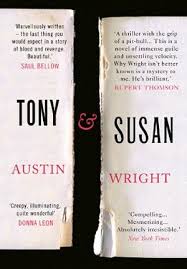Tony and Susan by Austin Wright 
Susan Morrow, comfortable if not entirely content in her marriage to hospital consultant Arnold, is contacted out of the blue by her first husband Edward. Edward always wanted to be a writer – indeed, his decision to abandon his law studies in pursuit of what Susan privately considered to be a hopeless dream was at least part of what led to the breakdown of their marriage. Now it seems that dream wasn’t so hopeless after all – Edward’s letter accompanies the manuscript of his first novel, Nocturnal Animals, which he wants Susan to read. ‘You always were my best critic’, he reminds her. Will she take a look at what he has written, and let him know what she thinks of it?
Of course Susan can’t resist. Was she right to dismiss Edward’s ambitions all those years ago, or does her ex have a genuine talent? Besides, with Arnold away at a conference, possibly with an old flame, Susan needs something to divert her. She begins reading more or less straight away – and finds herself propelled back into the past with disconcerting speed.
I honestly don’t know what I think of this book. I loved the concept, the way the book alternates between Susan-reading and what Susan is reading, i.e the story of Tony Hastings in Edward’s novel, Nocturnal Animals. Susan’s sections are both a commentary on that novel, and a story in their own right – the story of her marriage to Edward and her current suspicions about her second husband, the arrogant, unimaginative and rather blokish doctor Arnold. The first chapters of Nocturnal Animals, in which Tony Hastings has his life torn apart while en route with his wife and daughter to their summer place in Maine, are without a doubt the most compelling part of the whole. At this point I felt a genuine sympathy for Tony, as well as a driving compulsion to discover what happened next. I admired the style of the narrative, pared down and terse yet still fascinatingly introspective. Susan’s sections worked brilliantly with the Tony chapters, providing an effective contrast and an intriguing counterpoint with the shocking events as they unfolded in Nocturnal Animals.
So where did it all go wrong? For me, I think Tony and Susan began to come unstuck as Nocturnal Animals began to turn from tragedy to farce. Tony-the-victim is a pitiable figure. One feels for his initial predicament – indeed one suspects that one might not have behaved much better in similar circumstances – and the horror of the immediate aftermath of that predicament is brilliantly described. Yet Tony-the-avenging-angel is ridiculous, annoying and frustratingly gullible. His acquiescence in what happens next – a crime almost as repulsive and wrong-headed as the crime that led him there – proves the final nail in the coffin of credibility. I’d be fine with all this if I were convinced Austin Wright meant us to feel this way, if Nocturnal Animals were intended as some kind of Dostoevskian comment on the criminal-as-us, but I’m not convinced this is the case. The whole thing feels clumsily handled, as if Wright – and through him, Edward – wasn’t entirely sure what he meant us to think of Tony, and by extension the novel as a whole.
And in the end, Susan’s own story isn’t interesting enough to compete with Tony’s. I’d be the last reader to demand melodrama, but I was left wanting more here, and not in a good way.
I would definitely recommend Tony and Susan, because in spite of the novel’s flaws, there’s a lot to enjoy. There’s the form, for a start, so full of the potential to fascinate, which for a lot of the time it absolutely does. And whatever you think of the ending, or the characters for that matter, I absolutely guarantee you won’t be bored. You’ll keep on reading, turning those pages just like Susan, both excited and afraid of what you might find.